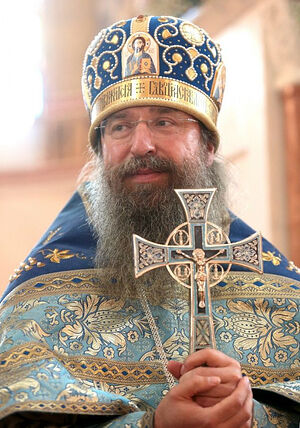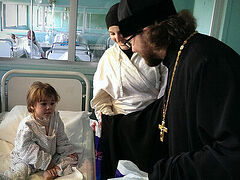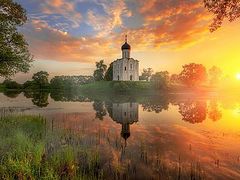 In the name of the Father, and of the Son, and of the Holy Spirit!
In the name of the Father, and of the Son, and of the Holy Spirit!
Our sins and shortcomings leave us only by prayer and fasting. Fasting was commanded to man already in Paradise. Through obedience to the will of God, Adam and Eve could have transfigured this world, but they didn’t restrain themselves in fasting.
St. John Climacus tells us: “Whoever wants to return again to Paradise does so in no other way but by fasting.” St. John Chrysostom tells us what fasting should consist of: “Let not only the body, not only the belly fast. Let our eyes fast; let our tongues fast; let our ears fast; let our hearts fast; let our hands and feet fast. Let our eyes not look upon what is inappropriate; let our ears not hear slander and condemnation; let our tongues not speak lies, condemnation, and untruths. Let our hands not take up what they didn’t put down, and let our feet not walk in the council of the wicked.”
As for “the council of the wicked,” this isn’t just some get-togethers that we don’t go to anyways—at clubs and so on. The Holy Fathers call “the council of the wicked” the get-together of our evil thoughts. So Holy Scripture prescribes “not to walk in the counsel of the wicked.” This “counsel” is destroyed by the Jesus Prayer, by the invocation of the name of God. Therefore, now, when we’re going through the arena of the Dormition Fast, let the fast not be just dietary for us, with just a change of food on the table. The most important thing is that, at least in this small stretch of time, we would labor for what is good and that there would be a change in our minds.
This good feat is the struggle with the passions and shortcomings. St. Basil the Great tells us: “We’re not body killers, we’re passion killers.” This is where we should turn our attention, starting today. This is why we need to strengthen not only the bodily fast, but also monitor what kinds of thoughts, words, and feelings are in our hearts. And most importantly, we have to strengthen our prayer. Those who haven’t been regularly reading the morning and evening prayers, let them read them regularly. Whoever has been reading the morning and evening prayers, let them add a kathisma a day. Whoever has been reading a kathisma, let them add a canon to the Savior, the next day to the Mother of God, the next day to the guardian angel, so that, as one ascetic of our time said: “Our ‘spiritual nut’ is tightened, not loosened.” Drivers know how important it is to tighten the nuts on their tires in a timely manner. After all, God forbid that a wheel should fall off and a disaster happen…
We have to watch over our hearts, so no sinister thoughts and feelings arise within them. And if they exist there, then we must labor for the sake of Christ, waging battle against these evil thoughts, words, and desires. For there can be either Paradise or hell within us. When we’re with God, when we’re in prayer, when we cleanse our minds, souls, and hearts, then there is Paradise. But when we give free rein to the passions, then there can be a living hell.
Once a valiant general went to see an elder. He was far from the Church, and his many victories brought him no joy; he had no peace in his soul, no grace. He understood that something very important was missing from his life, and his church-going friends told him: “Go take counsel from the elder.” The general went to see the elder and asked: “And what is Paradise? That is, what does man need in his life to have Paradise in his soul?” The elder answered: “You’re a scoundrel, a coward, and a traitor.” “And why’s that?!” The general was indignant and even pulled his sword out of its sheath. “I just tested you,” the elder said to him, “and that’s hell.” “Okay, I get it,” the general said, putting his sword back in the sheath, to which the elder commented: “And that’s Paradise.”
Such was the elder’s lesson. When we give free reign to our passions, that’s hell, but when we try to extinguish these passions, we can taste the sweetness of Paradise.
In life, if not with every step, then at least in every situation, we often hear from people: “You’re a scoundrel, a traitor, and a coward.” And even if it’s not always voiced, we can sense that that’s what people are thinking about us. In turn, we begin to think the same about them, and that means, we’re “pulling our sword out of its sheath.”
And, conversely, when we try to live according to the advice of Elder Paisios the Athonite, who says: “Turn on good thoughts,” and we try to rectify the situation and we start thinking: “I misheard. I misunderstood something. Maybe I screwed something up myself,” we get the opportunity to feel Paradise. And fasting helps us in this work.
At least during these holy festal days, let us try to have the most important thing—sobriety. After all, “Sobriety,” as the Holy Fathers teach, “is constant attention to our thoughts, words, and actions.” Where there is sobriety, there is the Christian life. Our every thought, our every word, our every action must correspond to the Gospel commandments. This is true fasting, true temperance, abstinence from the passions.
Let us remember the words of St. John Chrysostom: “Let not only your belly fast, but also your eyes, your tongue, your ears, your feet, and your hands.” Having lost Paradise by breaking the fast, we return to this Paradise by observing the fast, which means the Gospel commandments.
Amen.



